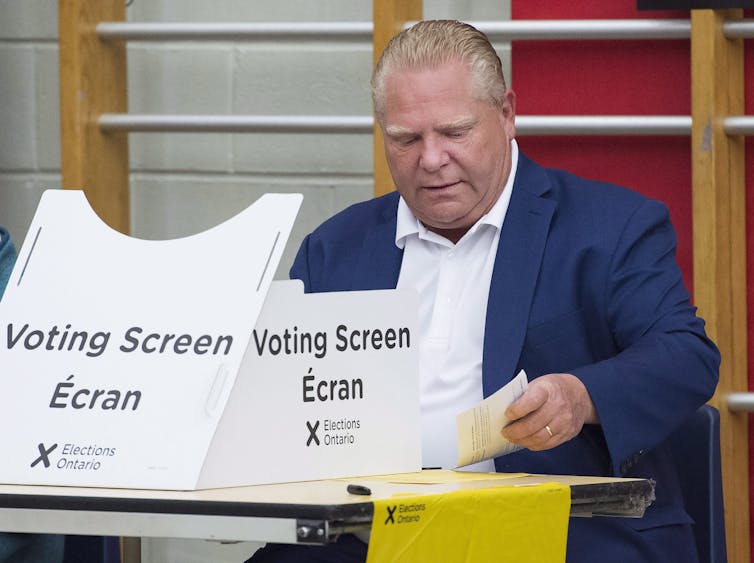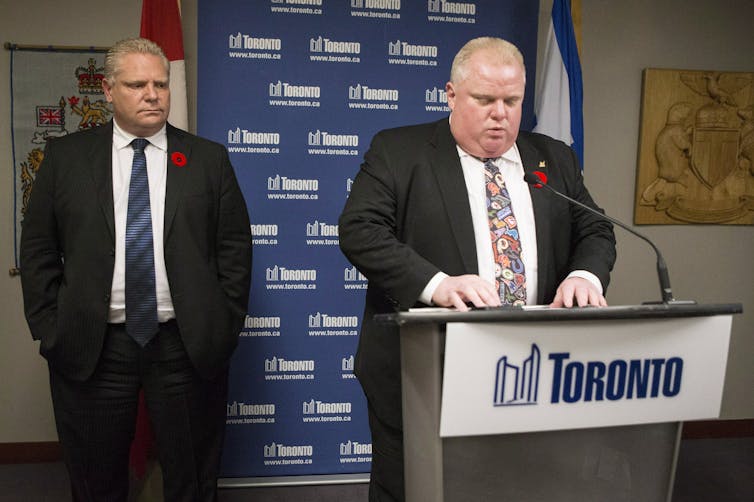Up until a few months ago, discussions of Doug Ford becoming premier of Ontario were relegated to amusing hypothetical conversations. However, the hypothetical “what if” has become reality.
The man many view as a Canadian Donald Trump has seized on a unique political opportunity to dethrone the province’s Liberal party and reassert Progressive Conservative control over the most populous province in Canada with a majority government.
For some, the prospects of Ford’s tenure as premier are concerning if not downright frightening. There is an understandable fear that Ford’s brand of right-wing politics will bring sweeping reforms to social programs while undoing many of the progressive policies enacted under Kathleen Wynne’s Liberal government.
While it’s impossible to predict precisely how his premiership will unfold, we can look to his rhetoric during the election campaign as well as his late brother Rob Ford’s tenure as mayor of Toronto for an indication of what might loom ahead.
Populism in the 2017 Ontario election
Doug Ford’s campaign platform was based on a number of well-worn conservative policy positions. From scrapping the carbon tax to reducing corporate tax rates and promising to balance Ontario’s budget within two years, Ford’s campaign, at least in terms of substance, relies on many of the same ideas and policy positions as other Canadian right-wing politicians.
What marks his campaign as unique, at least in Canada, is that these positions are couched within the language of populism. Ford has offered his candidacy and his ideas as a way to expel Liberal elites from power, remove the influence of “radical special interests” and, most importantly, to create a government that works on behalf of the people.

The populist framing of Ford’s campaign offers a reimagination of politics as a fight between hard-working, tax-paying citizens against out-of-touch “elites” beholden to special interests.
While there is no crystal ball to predict how successful Ford will be in following through with the specific promises outlined in his campaign platform, Ontario residents can expect that the populist discourse used to defeat the Liberals and NDP during the campaign will continue, and may even intensify in the future, as Ford pursues his legislative agenda.
With Ford at the helm, we should anticipate a major shift in political discourse over the next four years. Like Donald Trump to the south, Ford represents a different way of doing politics, one where political civility, technocratic knowledge and compromise are replaced by brashness, common-sense solutions and decisive unilateral action.
Ford’s successful positioning of himself as a voice of the people, and the harbinger of common sense, will force his opponents to adapt their strategies to appeal to Ontarians.
If this campaign demonstrated anything, it’s that using Donald Trump as a bogey man to scare voters away from Conservative politicians has only limited sway over the hearts and minds of voters.
For opponents at the centre and on the left of the political spectrum looking to draw support away from Ford, they’ll need to develop strategies to undermine his populist credentials while offering their own policies that appeal to those affected by a sense of disaffection and political alienation.
Rob Ford Redux?
While much has been written about the similarities between Ford and Donald Trump, Doug Ford most closely resembles the populist stylings of his late brother Rob. Doug and Rob Ford share a remarkably similar neoliberal world view centred on halting the proverbial “gravy train” by drastically reducing government spending vis-à-vis the privatization of government services.

Above all else, Rob and Doug Ford’s politics are shaped by staunch anti-elitism and anti-cosmopolitanism. Under brother Rob, this mixture of populism, neoliberalism and anti-elitism manifested itself in proposals to close homeless shelters, to end HIV/AIDS prevention programs and to cut funding for arenas, playgrounds, pools and day-care centres.
Doug Ford’s campaign for premier evokes the same underlying logic used by his brother as mayor. In order to strengthen his appeal to middle-class taxpayers, Ford has promised not to cut public sector jobs or reduce services. The successful alignment between Ford and the middle class represents a broadening of Ford Nation.
On the outside looking in are those who fall under the banner of special interests: The LGBTQ community, public sector unions and low-income communities.
So if we want to get an indication of where Ontario might be headed with Doug Ford as premier, we ought to examine his brother’s tenure as mayor and the groups alienated by Ford Nation.
While concern about Doug Ford may be widespread, it will likely be the most marginalized among Ontario citizens who are the most adversely effected by his premiership.
Author: Brian Budd: Ph.D Candidate, University of Guelph
Credit link: https://theconversation.com/ford-nation-rises-again-what-doug-ford-means-for-ontario-97985<img src="https://counter.theconversation.com/content/97985/count.gif?distributor=republish-lightbox-advanced" alt="The Conversation" width="1" height="1" />


